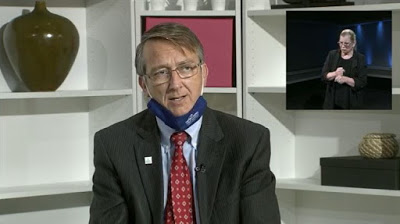FCPS promises more support for special ed students
 |
| Superintendent Scott Brabrand talks about special ed at a virtual town hall. |
Fairfax County Public Schools’ all-virtual spring term was frustrating for special education students and their families, Superintendent Scott Brabrand acknowledged, but promised things will be much better this fall.
“We are committed to overcoming those challenges, ”Brabrand said at a virtual town hall on special education Aug. 26. “We want this to be a successful year.”
FCPS will offer a more robust range of instructional and other supports to special ed students, he said. Every special ed student will have a case manager to maintain communications with parents.
Teachers are already back at work having conversations with parents about whether a student’s individual education program (IEP) needs to be revised, said Mike Bloom, assistant superintendent for special services. If parents haven’t been contacted yet, they should ask an administrator at their school to connect them with a case manager.
IEPs might need to be amended to determine how goals and services can be accommodated in a virtual environment, Bloom said. Some of these plans could be revised without a formal IEP meeting.
“We want to be flexible in how we provide services,” Bloom said. Extra support for special ed students could be provided during synchronous classroom sessions, asynchronous lessons, or during intervention time on Mondays.
School news: FCPS guidance for a virtual school start
FCPS will have a new approach to attendance this fall, with “multiple pathways to show kids are participating in learning,” Brabrand said. It’s about engagement, not just attendance. Students won’t be penalized academically if they are a little late or need to take a break.
Lessons will be recorded so students can tune in later. Case managers will schedule individual time with special ed students to review those recordings, Bloom said and will help students with attention deficits organize their materials and schedules.
A parent called in to express worries about an autistic child at home who can’t identify numbers or follow a multistep process to log into a virtual classroom.
Applied behavior analysis coaches will work with teachers on those kinds of issues, Bloom said, and can also work with parents and caregivers on creative solutions. However, “there is probably not a perfect solution for every student,” he conceded.
That’s why the most vulnerable kids, including preschoolers with disabilities, will be among the first cohorts coming back to school for in-person sessions in the coming weeks, Brabrand said. The second group will include special ed students who need an adapted curriculum.
Cohorts are groups of not more than 10 students who will stay together in one classroom all day and not mix with other students.
Engaging preschool students in a virtual setting is especially challenging. Edwin Windhausen, a special ed preschool teacher at Rose Hill Elementary School in Alexandria, said he tries to make learning as fun as possible. He noted that the beloved Mr. Rogers taught virtually (on his TV show) throughout his whole career.
Windhausen’s virtual classes aren’t all about staring at a screen for hours. He adds interactive components to a story, such as asking children to find an object in their home. His classes incorporate songs, puppets, and even yoga, into the school day.
Related story: Fairfax County Public Schools prepares for virtual learning
He is also scheduling one-on-one coaching time with families on how to engage their child in a more meaningful way. “We rely on their expertise to motivate students,” he said. “We want parents to feel empowered, to trust us as a partner.”
Mikaela Antonio, a special ed teacher and a case manager at Churchill Road Elementary School in McLean, plans to do frequent check-ins with parents during the first month. She wants to make sure parents and students are aware of the accommodations available to them.
Antonio said flexibility will be built into the school day for teachers to provide extra help to special ed students in general ed classes.
The Secondary Transition to Employment Program (STEP), which provides on-the-job training to high school special ed students preparing to move into the workforce, has been temporarily suspended during the pandemic, Bloom said. Instead, administrators are creating lesson plans to teach workplace readiness skills virtually.


The kids in the special ed programs are screwed Period SCREWED.
They need that 1 on 1 in person contact with their beloved teachers, assistants, other students, physical therapists, etc. There's been a lot of regression according to what I've been reading. It's really sad.
🙁
Despite my kids having 504s, we’re sticking with the school, but I hold Brabrand’s promises with a huge dose of salt. I don’t trust him anymore.
I do know some families that were in public school that have officially pulled out and are going private or homeschooling… at least one of them is in the special needs boat.
I’m going to be interested in what FCPS’s enrollment numbers are this year and how big of a hit they take.